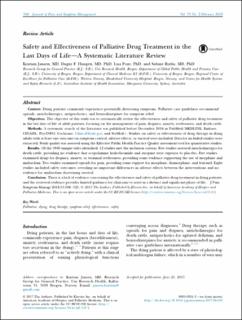Safety and Effectiveness of Palliative Drug Treatment in the Last Days of Life—A Systematic Literature Review
Journal article

Åpne
Permanent lenke
https://hdl.handle.net/11250/2663714Utgivelsesdato
2018Metadata
Vis full innførselSamlinger
Originalversjon
Jansen, K., Haugen, D.F. et al. (2018): Safety and Effectiveness of Palliative Drug Treatment in the Last Days of Life - A Systematic Litterature Review. Journal of Pain and Symptom Management 55(2), 508–521.e3. https://doi.org/10.1016/j.jpainsymman.2017.06.010Sammendrag
Context
Dying patients commonly experience potentially distressing symptoms. Palliative care guidelines recommend opioids, anticholinergics, antipsychotics, and benzodiazepines for symptom relief.
Objectives
The objective of this study was to systematically review the effectiveness and safety of palliative drug treatment in the last days of life of adult patients, focusing on the management of pain, dyspnea, anxiety, restlessness, and death rattle.
Methods
A systematic search of the literature was published before December 2016 in PubMed/MEDLINE, Embase, CINAHL, PsycINFO, Cochrane, ClinicalTrials.gov, and SveMed+. Studies on safety or effectiveness of drug therapy in dying adults with at least one outcome on symptom control, adverse effects, or survival were included. Data for included studies were extracted. Study quality was assessed using the Effective Public Health Practice Quality assessment tool for quantitative studies.
Results
Of the 5940 unique titles identified, 12 studies met the inclusion criteria. Five studies assessed anticholinergics for death rattle, providing no evidence that scopolamine hydrobromide and atropine were superior to placebo. Five studies examined drugs for dyspnea, anxiety, or terminal restlessness, providing some evidence supporting the use of morphine and midazolam. Two studies examined opioids for pain, providing some support for morphine, diamorphine, and fentanyl. Eight studies included safety outcomes, revealing no important differences in adverse effects between the interventions and no evidence for midazolam shortening survival.
Conclusion
There is a lack of evidence concerning the effectiveness and safety of palliative drug treatment in dying patients, and the reviewed evidence provides limited guidance for clinicians to assist in a distinct and significant phase of life.
